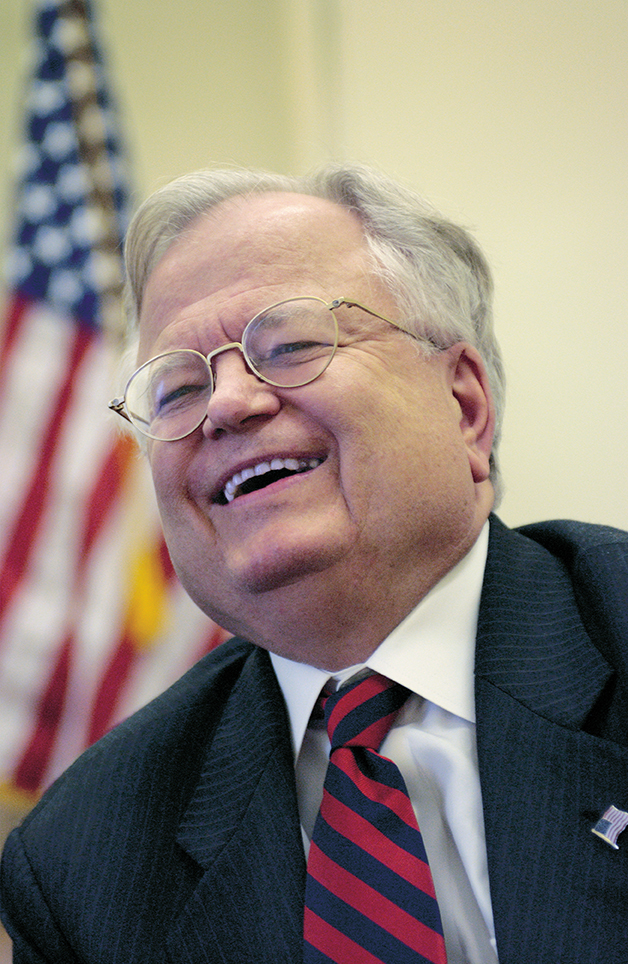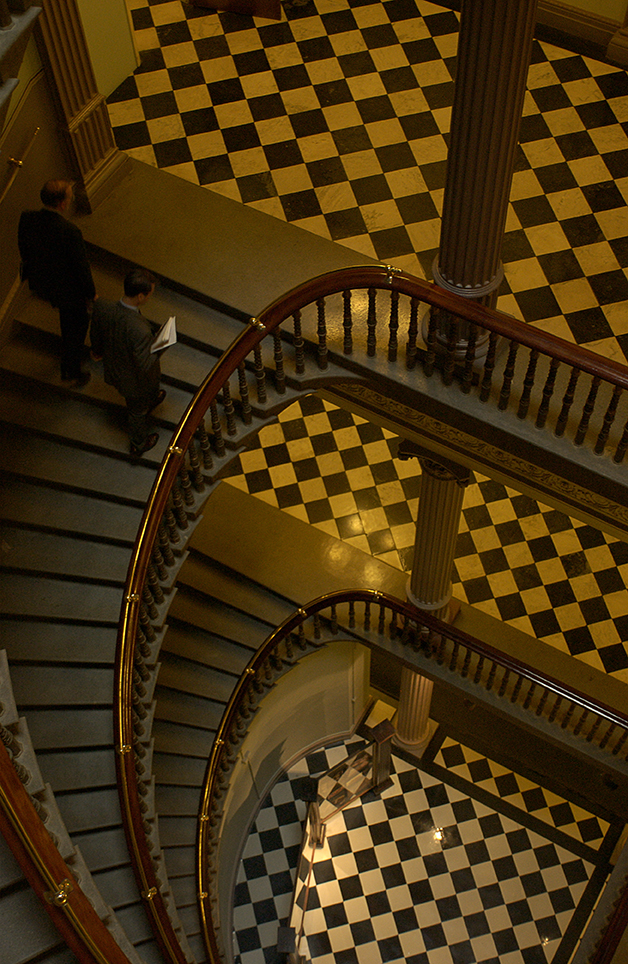
Washington D.C.’s Old Executive Office Building has stood brooding at the corner of 17th Street and Pennsylvania Avenue since 1871.
On this gray fall day, its granite countenance surveys scores of passers-by, two security specialists deployed under a tent on the front lawn and a trio of gray squirrels.
The squirrels scurry in and out of the shadows of two mature trees that, along with the security detail, stand sentinel to the venerable building’s Appointment Entrance.
The National Historic Landmark, christened the Eisenhower Executive Office Building in 1999 (a name that hasn’t caught on yet) houses the bulk of offices for staff members of the White House, the Vice President’s office and the National Security Council — including the NSC office of Deputy Assistant to the President and Coordinator for Strategic Planning to the National Security Adviser Robert D. Blackwill ’62/62.
“One could say that I had a slow start,” says Blackwill about his academic career at the University of Wichita. He laughs. “I played on the varsity tennis team — and spent countless hours at The Cedar. Are you familiar with the place?”
The Cedar, still a favored Shocker haunt, also plays prominently in Jon Roe’s memories of Blackwill. “On occasion,” says Roe ’61, who is a Wichita-based journalist, writer, poet and artist, “Bob even bought his own beer.”
The two met while taking graduate courses in English after Blackwill — despite tennis and the attractions of The Cedar — had earned two undergraduate degrees, one in English and the other, history. “My alma mater gave me two great gifts,” he relates as he settles in for a 22-minute talk in his pale yellow NSC office. “A love of history and the English language: These two things have been of great benefit to me through the course of my career.”
That career is an impressive one. Sworn in as U.S. ambassador to India by President George W. Bush in June 2001 after having served as Bush’s foreign policy adviser in the 2000 presidential campaign, Blackwill left his diplomatic post and accepted his current position with the NSC in August.
As ambassador, he has been credited with strengthening U.S.-India relations, encouraging the lifting of U.S. economic sanctions imposed after India’s 1998 nuclear tests and helping to reduce tensions between India and Pakistan.
Before his two-year assignment in India, he taught foreign and defense policy and public policy analysis at Harvard University’s John F. Kennedy School of Government. During his 14 years at Harvard, he was named the first Belfer Lecturer in International Security and served as associate dean of the Kennedy School, as faculty chair of its Executive Program for U.S. and Russian General Officers and of its Chinese Security Studies Program.

Prior to his academic career, Blackwill spent 22 years in the foreign service and served at the State Department under Secretaries Henry Kissinger, Alexander Haig and George Shultz.
He was U.S. ambassador and chief negotiator at the Conventional Force Negotiations with the Warsaw Pact in Vienna and was special assistant to President George H. W. Bush for European and Soviet Affairs in 1989-90. In 1990, he was awarded the Commander’s Cross of the Order of Merit by the Federal Republic of Germany for his contribution to German unification.
Blackwill is also the author and co-editor of numerous books and articles on U.S. foreign policy, including America’s Asian Alliances, with Paul Dibb (The MIT Press, 2000) and New Nuclear Nations (1993), co-edited with Albert Carnesale.
In his current White House role as deputy assistant to President Bush and coordinator for strategic planning under National Security Adviser Condoleezza Rice, Blackwill helps develop and coordinate the mid- and long-term direction of American foreign policy.
One of Blackwill’s mentors relates that Blackwill brings many strengths with him to his newest post: “He’s an outstanding thinker in foreign policy, a distinguished ambassador and a first-rate scholar,” says Dr. Henry Kissinger from Kissinger Associates Inc. offices in New York City.
“A force of nature” is how one of Blackwill’s colleagues describes the Quinter, Kansas, native, according to Newsweek’s Evan Thomas in a Sept. 1 article that continues, “Blackwill has no particular ideology; he is likely to be evenhandedly blunt with neoconservatives and internationalist moderates alike. It will be Blackwill’s job to help chart a new strategic course for the Bush administration in Iraq, Iran and Afghanistan and, just as important, to ride herd on feuding government agencies and Congress to make sure the new direction gets followed, and quickly.”
Blackwill politely declines to provide any road markers for this “new direction” in Bush administration foreign policy, but does say that his own foreign-policy beliefs are grounded in three “political points about freedom”: that people everywhere want “freedom of choice”; that they are “enormously concerned about family”; and that Israel and the United States seem to offer the widest array of personal freedoms to their citizens — especially the freedom to break social castes and fulfill individual potential.
“I grew up in a setting in which foreign territory was Colorado,” Blackwill says and smiles. “My father was a carpenter, and I was the first member of my family to graduate from college. I never dreamed back then that someday I’d have the privilege to do what I do now. Only in America.”
When Heroes Always Wore White Hats
“Bob is incredibly smart,” Roe says about his old grad-school friend. “He has the ability to assimilate facts very quickly. I never considered Bob political in the sense that he would go out and march for causes. He always seemed more interested in the political process, the game — the results.”
Blackwill and Roe’s shared interests while at Wichita State centered on their English language and literature graduate studies, although Blackwill’s studious eye, Roe says, roved across many realms to include — Frank Sinatra and romance.
“His knowledge of Sinatra was used to impress girls,” Roe recalls. “Once, my wife (Myrne ’70) and I were gone for a couple of weeks. We let Bob use our house. We came back to find all the Sinatra records out and our best dishes in the backyard where Bob had had picnics with friends.”
As grad students, Blackwill and Roe were both writers and voracious readers, and they both worked on the university’s 1964 literary journal, Mikrokosmos. Roe served as editor, Blackwill as poetry editor.
“Bob was a pretty good poet,” Roe recalls. “I remember that he won the Mikrokosmos poetry award for a poem he wrote about old cowboys and good guys and bad guys — an interesting choice of subject in light of his later career in Washington.”
Titled “Remember,” here’s Blackwill’s 1964 award-winning poem:
Remember when heroes always wore
White hats and rode white horses.
Tom Mix who mixed it up and
Swore to uphold everything. And
then the beginning with Hoot Gibson
And the black hat. All in white
Hoot went riding — except the hat.
And then Charles Starret dressed
All in black except the horse, of course,
White. And finally Lash Larue
Who rode black clad on black.
It used to be so easy to tell
The good guys from the bad.
At least there are still Indians.
A few years later, Blackwill and Roe traveled to San Francisco, where, Roe says, “we rubbed shoulders with some of the Beat poets. Bob can get on with anyone. He has a way of establishing common ground with people.”
After college, Blackwill, who once said that he “ached to see what was out in the wide world,” joined the Peace Corps and taught in the African republic of Malawi. While there, he helped a friend study for the rigorous exams required of foreign service officers and decided to take the exams himself. He passed both written and oral tests, and began his career in 1967, living in such places as Kenya, England, Israel and Austria.
History as Last Year’s Sears Catalogue

is credited with installation of the brass rails seen
in this photo at the Old Executive Office Building.
Built between 1871 and 1888, the building was
originally intended for the departments of State,
War and Navy.
During a 1989 Forum Board Homecoming Lecture at WSU, Blackwill said, “Before coming to this university, my idea of history was last year’s Sears catalogue. My utter ignorance of history changed in the classrooms and offices of this institution, and it especially changed because of Dr. Kelley Sowards (1924-96). The love of history opened up a vista so vivid, so rich and sometimes so powerfully awful that it has become a part of who I am.”
Through his own talents, initiative and determination, Blackwill has seen a good portion of recent history unfold from a front-line perspective. Sadly, the “powerfully awful” has been prominent, and Blackwill bleakly recites a historical list of horrors that include the executions of an estimated 1.5 million by the Khmer Rouge led by Pol Pot in Cambodia, the Hutu-Tutsi atrocities in Rwanda and the unfathomable cruelties Saddam Hussein and his regime inflicted on the people of Iraq.
“More than 100 mass graves have been found there,” Blackwill relates. “Tens of thousands of people were buried there in the sands of the desert.”
Despite such horrendous evidence of man’s inhumanity to man, Blackwill, who is married and the father of five, remains, if not optimistic, at least white-hat, black-hat balanced in his view of the future.
About Iraq, for example, he says, “President Bush has a vision that Iraq and the Mideast can become democratic — over time.” He stresses his last two words. And then with a warm smile in his eyes, he says that “without a doubt” the richest, the most vivid historic event he’s witnessed so far “is German unification — that is a triumph of humanity.”
Although Blackwill hasn’t returned to Kansas for many years now, he says he carries with him much that is of Kansas: “I brought back East more than 30 years ago the values of Kansas and its people: honesty, candor, compassion, hard work, a dogged stamina in the face of challenge and adversity, a sense of humor, a recognition of one’s own limitations and a deep and abiding love of country."





